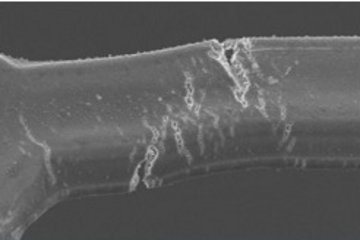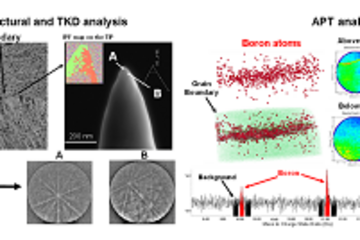All genres
361.
Talk
Ultrafine grained dual phase steels: Effect of grain size on mechanical properties. Thermomechanical Processing of Steels, Padova, Italy (2008)
362.
Talk
Microstructure and texture of hot-rolled duplex stainless steel. Thermomechanical Processing of Steels, Padova, Italy (2008)
363.
Talk
Influence of the initial microstructure on the hot deformation of duplex stainless steel. 6th European Stainless Steel Conference, Helsinki, Finland (2008)
364.
Talk
Microstructure and Texture Evolution during Intercritical Annealing with and without Deformation in the Production of Ultrafine Grained Ferrite/Martensite Dual Phase Steels. 15th International Conference on Textures of Materials (ICOTOM15), Carnegie Mellon University Center in Pittsburgh, PA, USA (2008)
365.
Talk
Microtexture Characterization of Duplex Stainless Steel after Hot Working. 15th International Conference on the Texture of Materials (ICOTOM 15), Carnegie Mellon University Center in Pittsburgh, PA, USA (2008)
366.
Talk
Mikrostrukturuntersuchungen an ultrafeinkörnigen Dualphasenstählen. DGM-DVM AK-Treffen “Mikrostrukturuntersuchungen im REM“, Ilmenau, Germany (2008)
367.
Talk
Fabrication of Ultrafine Grained Ferrite/Martensite Dual Phase Steel by Large Strain Warm Deformation and Subsequent Intercritical Annealing. ISUGS 2007 (International Symposium on Ultrafine Grained Steels), Kitakyushu, Japan (2007)
368.
Talk
The formation of ultrafine grained microstructure in a plain C-Mn steel. International Symposium of Ultrafine Grained Steels ISUGS-2007, Kitakyushu, Japan (2007)
369.
Talk
Ultrafine grained dual phase steels. GLADD Meeting, Aachen, Germany (2007)
370.
Talk
Grundlagen der gefügeabhängigen Modellierung von Warmumformprozessen. VDI Tagung Massivumformung, Leonberg, Germany (2007)
371.
Talk
Thermo-Mechanical Treatment of Spring Steels. COM 2006, Conference of Metallurgists, Advanced Steels, Montreal, Québec, Canada (2006)
372.
Talk
Warmumformbarkeit von Stahl. Kontaktstudium Werkstofftechnik Stahl, Teil III, Technologische Eigenschaften, Institut für Umformtechnik und Umformmaschinen (IFUM), Universität Hannover (2006)
373.
Talk
Optimized Thermomechanical Treatment for Strong and Ductile Martensitic Steels. Thermec’2006, International Conference on Processing & Manufacturing of Advanced Materials, Vancouver, Canada (2006)
374.
Talk
Modern high strength steels for automotive applications. Robust Processes with Modern Steels, INPRO Innovationsgesellschaft für fortgeschrittene Produktionssysteme in der Fahrzeugindustrie mbH, Berlin, Germany (2006)
375.
Talk
Eigenschaftsoptimierung hochfester martensitischer Stähle durch Mikrolegierung und thermomechanische Behandlung. Meeting Arbeitskreis „Grundlagen der Umformtechnik“, Stahlinstitut VDEh, im Stahl-Zentrum, Düsseldorf, Germany (2006)
376.
Talk
Design of High-Strength Steels by microalloying and thermomechanical treatment. TMS 2006, San Antonio, TX, USA (2006)
377.
Talk
Nanostrukturierte Stahlwerkstoffe – Eigenschaften, Analytik. DVS-Forschungsseminar Nanotechnologie, Materialprüfanstalt, Universität Stuttgart, Germany (2006)
378.
Talk
Mechanical properties of an ultrafine grained plain C–Mn steel. ISUGS2005, Sanya, China (2005)
379.
Talk
The formation of ultrafine grained microstructure in a plain C-Mn steel. Super-High Strength Steels, 1st International Conference, Rome, Italy (2005)
380.
Talk
Optimizing the Mechanical Properties of Tempered Martensitic Steels. Super-High Strength Steels, 1st International Conference, Rome, Italy (2005)











